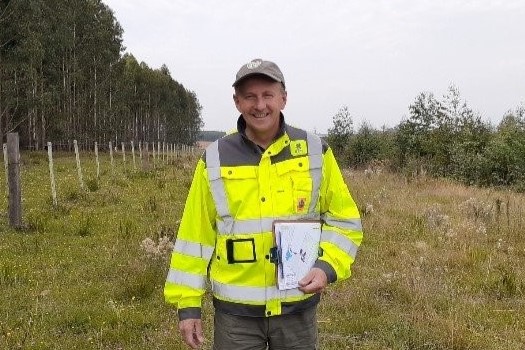 Putting the super in forestry supervisor in Uruguay
Putting the super in forestry supervisor in Uruguay
As part of our Humans of Pulp series, we caught up with Homero Martinez, a UPM Forestry Supervisor, as he goes about his daily business in Uruguay’s Río Negro. His role goes beyond forestry into the community – and he wouldn’t have it any other way.For UPM Forestry Supervisor Homero Martínez, his work is largely a labour of love.
"It is very dynamic, and each day represents a new challenge. One day I may go out with a specific supervisor, others I focus on the administrative work, preparing reports or tasks within the IT system. By going to different places, I bond and interact with different people who have different interests, opinions and expectations," he says.
Martinez has been working as a forestry supervisor with UPM for nearly 13 years. He began in the southwest region of Soriano department, before moving north to the border town of Quebracho. Finally, his family put down roots in their current location of Durazno on the Yí river.
Throughout his career, he has had one wish: to be at home every night with his family and live in a place where his wife could work as well.
Communication is crucial
The forestry supervisor is one of UPM's point of contact for the local community, making it a crucial role. Despite the title, Martinez's job is about far more than just dealing with trees.
He must maintain contact with local leaders, regional contractors and authorities to ensure that everything runs smoothly and, perhaps most importantly, make sure that people in the region are informed of what is happening at all times – right down to when and why trucks will be passing through a town or city.
On top of this, he even has to ensure the safety of cattle and bees. This is because 40% of UPM´s field is left unplanted and used for different purposes, like cattle grazing, biodiversity conservation and internal roads.
"Within our role, we must ensure that these animals are healthy and documented. We also work with associations or organized groups of beekeepers, who leave their apiaries on-site. These must also be regulated and maintained,” Martínez explains.
Martínez believes that the role has evolved over time. In the last 10-15 years afforestation has grown a lot in Uruguay, he has had to change as well. "I feel that we have matured and improved our communication, although there is always room for improvement”, he says.
“When an operational setback occurs in the field of a Fomento producer – who are the owners of the land we lease – we want them to hear about it from us. This means we can advise the producer about how to solve any issues and come up with a solution together,” he explains.
Planning ahead
Martínez believes that planning plays a crucial role in his work. "It is normal for me to have my work planned for the next 10 days. This makes it easier to carry out my activities in a more orderly and efficient way. There are always things that come up along the way, but I consider it necessary to keep the producer regularly updated on the progress of activities - even if he or she does not request it.”
Before starting to work with a new producer, there are a number of steps that must be carried out. UPM does not own much land in this region, so a great deal of work is done in third-party fields as part of the company’s Fomento cooperation programme for local landowners. There are days when Martínez travels 130 kilometres to reach a site, before driving a further 120 kilometres between other sites. Only then can he begin the journey home.
The man who knows everything
"I am also responsible for administrative work, safety tasks and taking care of the environment. We have to watch over everything, keep the roads in good condition, notify the community of the circulation of trucks and verify that all operators have the right permits to use machinery," he adds.
He greatly values this interaction with the community. "Telling a school that a project is going to be carried out or explaining to them the process involved makes a difference to everyone. Developing a strong bond with key members of the community is not only a good thing to demonstrate how the forestry sector works, but it is also essential to strengthen the link between UPM and the local communities," explains Martinez.
He likes having the challenge of knowing that the trucks are safely passing through a specific town or that trees are being planted in another – all with the local community fully informed and up to date. Homero Martinez is a man who keeps tabs on everything that happens in and around his forest while making sure everyone else knows exactly what he is doing. And that is the sign of a great forestry supervisor.
Text: Tamara Ubilla
UPM - FINLANDIA - 30 Junio 2020
